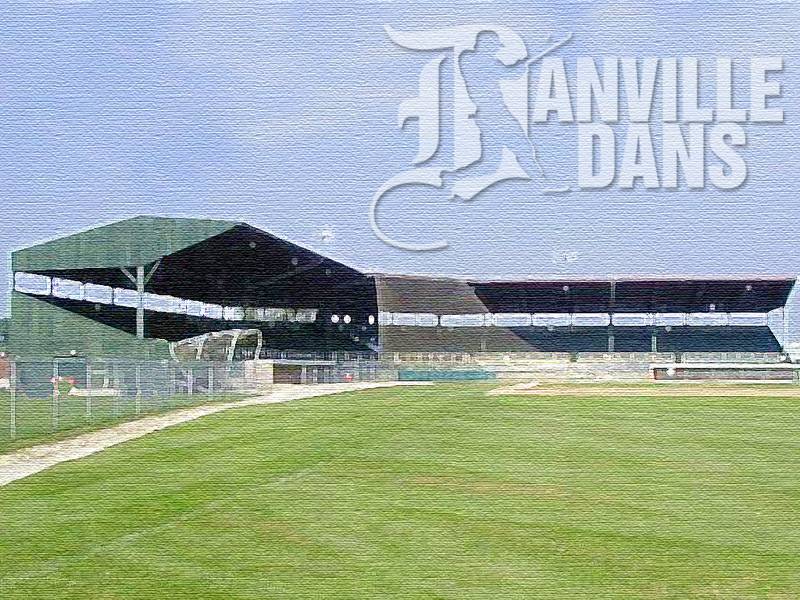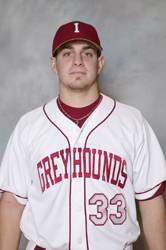
If catching a baseball game means sitting in the hot sun with a cold beer, then there’s no substitute for Danville Dans baseball in east-central Illinois. Attending a game at Dans Stadium truly feels like you’ve stepped into a time machine, from the WWII-era wooden grandstand (once home to the Brooklyn Dodgers’ Class B affiliate), to the budget-friendly admission (still just $5) and food and beverage prices, to the broad cross-section of the surrounding community that comes out to games.
The Dans begin their 2010 slate tonight at 6:30 p.m. against the Dubois County Bombers (click here for the full home schedule). The season will run through early August, with the Dans’ final regular season game scheduled for August 7 at Terre Haute.
Danville has been a longtime member of the amateur wood-bat summer league formerly known as the Central Illinois Collegiate League (CICL) and now known as the Prospect League. Dans co-owner and general manager Jeanie Cooke explained, “The only difference fans will see is the number of different teams they will see in their ballparks. As so many states are encompassed, the name CICL needed to be updated to reflect our current footprint.”
Indeed, teams from Nashville, Tenn., and Beckley, W.V., will make the trek to Danville this season. Danville will be in the Central Division of the Prospect League, along with Dubois County (Ind.), Terre Haute, Nashville, and Richmond (Ind.).
Players on summer break from college programs around the country (this year’s roster includes players from schools in California, Texas, Mississippi, Alabama, Florida, and Louisiana, as well as Indiana and Illinois) play in the Prospect League. “Each team does their own recruiting,” Cooke said. There’s no compensation allowed under NCAA rules, so many players stay with local host families to save money.
The main rule difference from college baseball is that Prospect League players use wooden bats, rather than the offense-enhancing aluminum bats of college baseball. That makes for a style of play more similar to professional baseball. There are similar leagues all across the country, but the best-known is probably the Cape Cod League, immortalized in the classic Freddie Prinze, Jr. movie Summer Catch.
While the top college prospects are spread between the many leagues, Danville has seen its share of great players come through. The Boston Red Sox’ Jonathan Papelbon is probably the best-known Dans alum. “In this year’s NCAA regional [which includes the nation’s top 64 teams], we have 21 former or current Dans participating,” Cooke said. A few of those will be late in reporting to Dans action, as their college season has yet to conclude.
MEET A DAN

University of Indianapolis righthanded pitcher Donovan Drake (right) is one of five Dans who are returning to the squad from the 2009 team. Drake is coming off a successful sophomore season for the Greyhounds: he went 7-4 with a 3.39 ERA and was named to the All-Midwest Region First Team.
Drake stayed in an apartment with a teammate last summer, and this year he’s residing with a host family, who volunteer to house players during the summer season. “They give you a place to sleep, which is basically all you need for the summer,” Drake said. “All the other time is focused on baseball. You do the dishes when you eat, keep your room clean, and do your laundry, and you’re good.”
Summer ball gives Drake the opportunity to play on a bigger stage than he’s used to for the NCAA Division II Greyhounds. “There’s more fans, obviously, because summer ball is pretty exciting to watch, a lot of big scores and we come to a lot of small towns that love baseball,” he noted.
Drake’s workload will increase a little bit over his one-start-a-week schedule during the college season. “Like in the pros, you start every five days, and I expect that’s what it will be like for a starting pitcher. I think it’s going to be a little different. You want to keep your arm healthy, obviously, and probably throw a little more to build the arm strength to throw every five days instead of every seven days like you do in college.”
After his successful run in the spring, Drake is looking forward to attacking hitters more in the wood-bat season. He explained, “With wood bats, I like to pitch to contact more. With metal bats, you get those bleeders that drop for base hits, and those eventually kill you, but in summer, the ball doesn’t come off the bat as hard, and those bleeders turn into outs.”








